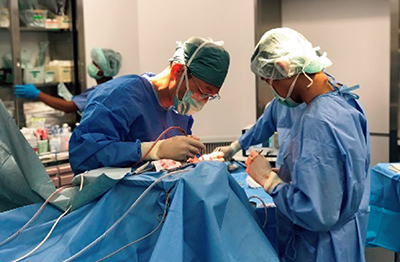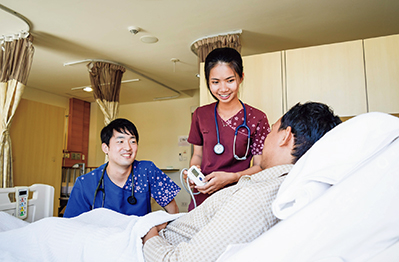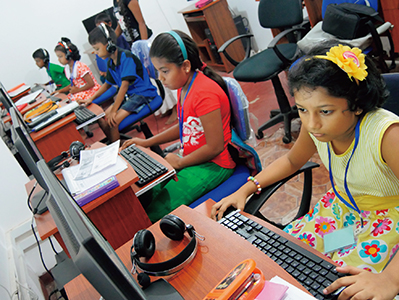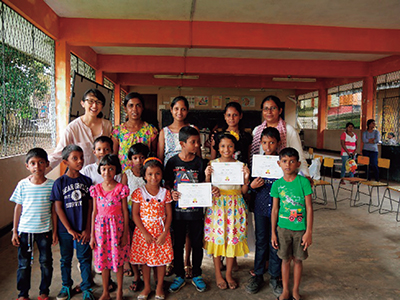ODA Topics 6
Government Aid Alone Is Not Enough? Mobilization and Utilization of Non-ODA Development Finance
• ODA and Private Finance
The White Papers on Development Cooperation have been describing many Official Development Assistance (ODA) projects. However, did you know that ODA actually accounts for only approximately 15% of the total flow of funds from developed to developing countries? Global ODA flows were approximately $190 billion in 2017. Meanwhile, private direct investment in developing countries was approximately $540 billion and overseas remittances by individuals approximately $430 billion, far exceeding the ODA amount*1.
According to estimates of the United Nations Conference on Trade and Development (UNCTAD), $3.9 trillion is needed annually to achieve the Sustainable Development Goals (SDGs) by 2030, but currently an annual shortfall of $2.5 trillion is being projected. With countries facing severe financial situations, the question is how to utilize abundant private funding for sustainable development.
• Coordination with Private Finance
Japan uses ODA to bring the most out of the private sector through such frameworks as JICA’s Private Sector Investment Finance (PSIF) and SDGs Business Supporting Surveys (see “(1) Partnership with Private Companies” and “Master Techniques from Japan to the World” for details on Public-Private Partnership initiatives).
An example is Sunrise Japan Hospital in Cambodia. JICA provided PSIF loans when JGC Corporation, Innovation Network Corporation of Japan (now INCJ, Ltd.), and Kitahara Medical Strategies International Co., Ltd. decided on investment in a private hospital development project and on establishment and operation of the hospital. Through this assistance, a hospital that offers the latest Japanese-style medical service has been established in Cambodia. In addition, Japan not only provided medical equipment through grant aid, but also invited 60 Cambodian physicians, nurses, and other healthcare workers to Japan before the opening of the hospital, to equip them with medical skills and know-how through technical cooperation. Such assistance combining several schemes is unique to Japanese development cooperation. As a result of these efforts, Sunrise Japan Hospital was able to realize reliable Japanese-style healthcare services with medical staff providing medical care with consideration for the feelings of patients and their families in Cambodia, where quality medical services were called for.
In addition to the realization of business expansion of Japanese companies, another major achievement is that the hospital established by this project has become a valuable place where young Japanese physicians who want to hone their skills overseas can gain experience. The hospital initially had approximately 1,300 outpatients per month when it opened in 2016 but it has tripled to approximately 4,500 by 2018, making a significant contribution to improving the health of the Cambodian people. Japan’s assistance in this project has generated a win-win effect for all parties involved.
Furthermore, under the SDGs Business Supporting Surveys, JICA helps match the outstanding products and technologies of private companies with the development needs of developing countries based on proposals from the companies, and provides support to establish businesses that contribute to solving problems in developing countries.
For example, SuRaLa Net Co., Ltd. conducted a preparatory survey in Sri Lanka on e-learning materials that use animation to teach math in a game-like manner, taking advantage of the Preparatory Survey on BOP Business (now the SDGs Business Verification Survey with the Private Sector). As an outcome of this survey, an e-learning system was introduced in Sri Lanka, while women from impoverished areas were trained as “facilitators” to give guidance to children. This project contributes to the improvement of the academic ability of local students and employment creation for women.
In response to the prolonged closure of schools in Sri Lanka due to the spread of COVID-19, SuRaLa Net also began providing online e-learning for free soon after the schools were closed. From March to August 2020, the company provided math learning support that can be accessed at home for approximately 660 children. Such support makes use of the innovation, knowledge, experience, and speediness of the private sector and cannot be achieved by the government alone.


Japanese and Cambodian staff providing medical care at Sunrise Japan Hospital (Photo: Sunrise Japan Hospital)
• International Discourse on Mobilization of Private Finance and Japan’s Efforts
The need to mobilize private finance for the development of developing countries to achieve the SDGs has gained growing recognition in the international community. For example, in 2017, the OECD Development Assistance Committee (DAC) announced the Blended Finance (BF)*2 Principles and is encouraging the active mobilization of private finance.
Japan, as the 2019 presidency of the G20 Summit in Osaka, confirmed the important role of innovative financing mechanisms, including BF, in upscaling collective efforts with G20 countries in the leaders’ declaration. In the same year, Japan also organized the Meeting of the Leading Group on Innovative Financing for Development and led the discussion on this topic. Additionally, an advisory panel to consider new funding mechanisms for SDGs was established for discussing innovative financing methods and areas in which resources should be used to secure financial resources necessary to achieve the SDGs. In July 2020, the advisory panel submitted to Foreign Minister Motegi a report (summary of final discussion) containing recommendations for promoting the mobilization of private finance, such as impact investment and BF.
• New International Statistical System
The importance of mobilizing additional financial resources for developing countries is indisputable. On the other hand, there is not necessarily a framework for tracking the overall flows of development finance beyond traditional ODA globally. In response to this need, a new statistical system is currently under consideration, led by the OECD-DAC, called the Total Official Support for Sustainable Development (TOSSD).
This system, under a full-fledged discussion since the DAC High Level Meeting in 2014, aims to track a wide range of official financial flows that contribute to sustainable development. If TOSSD comes into fruition, it will enable the monitoring of development finance from non-DAC members that are new actors in development cooperation, such as China, India, Russia, Brazil, Turkey, Saudi Arabia, and the UAE. It will also capture financial resources that do not necessarily have development as their main objective and even private finance mobilized by the involvement of official funds, as long as they contribute to sustainable development.
TOSSD is a grand attempt to broadly capture and make visible the flow of development resources from all donors to developing countries. Japan has many development financial resources that cannot be measured by traditional ODA, and this system will allow Japan to further demonstrate its contribution to sustainable development to the international community.
Since 2017, the International TOSSD Task Force, which includes emerging donors and developing countries, has been addressing technical matters, including the scope of resources to be monitored and calculation methodologies. Japan will continue to actively participate in these processes. While the reporting of TOSSD data has only recently begun, it is hoped that reporting of TOSSD becomes more widespread among non-DAC donors in the future.
With the globalization of the economy, flows of private resources to developing countries now far exceed the total amount of ODA. In this context, ODA must serve as “a catalyst for mobilizing a wide range of resources, including the private sector” (Development Cooperation Charter). Japan will continue to actively contribute to the creation of international rules for broader and more efficient mobilization of sustainable development funds, including non-ODA official funds and even private resources.

Children learning math using the e-learning system of SuRaLa Net (Photo: SuRaLa Net)

Award ceremony for women facilitators and children who studied through the e-learning system (Top left: SuRaLa Net employee who attended the award ceremony) (Photo: SuRaLa Net)
*1 OECD Resource flows beyond ODA in DAC statistics (http://www.oecd.org/dac/stats/beyond-oda.htm)
*2 Blended finance (BF), according to the OECD definition, is a new way of strategically using finance for development purposes and mobilizing for-profit commercial finance for sustainable development. The BF Principles are: (i) anchor BF use to a development rationale; (ii) design BF to increase the mobilization of commercial finance; (iii) tailor BF to local context; (iv) focus on effective partnering for BF; and (v) monitor BF for transparency and results.
